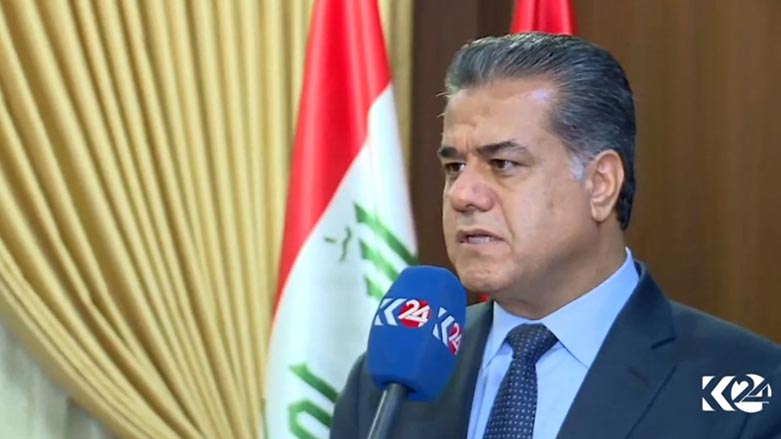We maintain strategic partnership with US
Head of KRG Foreign Affairs

WASHINGTON DC, United States (Kurdistan 24) - Minister Falah Mustafa, head of the Kurdistan Regional Government’s (KRG’s) Department of Foreign Affairs, paid a brief visit to Washington this week to mark the 25th anniversary of Operation Provide Comfort—the U.S.-led military operation that helped return home a half million Kurds who fled to the Turkish mountains, as Saddam Hussein’s forces repressed their post-Gulf War uprising.
One cannot overstate the enduring importance of Provide Comfort to the Kurds of Iraq. In an interview with Kurdistan24, Mustafa repeatedly stressed that point, as well as the value that the KRG places on maintaining and developing its strategic relationship with the US.
Provide Comfort planted the seeds of “strong partnerships and friendships” between Kurds and Americans, Mustafa explained. Lt. Gen. Jay Garner, now retired, was the commander of the intervention force that established the Kurdish safe haven. When Garner visits Kurdistan, the door of KRG President Masoud Barzani “is always open for him.” Barzani tells Garner, “You helped lay the foundation for what Kurdistan is today.”
That sentiment extends to America more generally. “The KRG looks to a strategic partnership with the US,” Mustafa affirmed.
“We were together in 1991 for Provide Comfort,” which then allowed us to build Kurdistan and develop our institutions. “We were together in 2003 to liberate Iraq,” he continued. “And in August 2014, the US again proved that they stand by us when they came to protect the Kurdistan Region” from the Islamic State (IS.)
Each crisis has renewed and strengthened the bonds between Americans and Kurds first established during Provide Comfort.
In 2005, while on a trip to Washington, President Barzani paid a visit to the US Army’s Walter Reed hospital to visit wounded soldiers, some badly maimed. The soldiers were very moved. They told Barzani that this was the first time an Iraqi had come to thank them. “At least we know that we did something good,” they said.
“It was Kurds,” Mustafa noted, who thanked them. “And not a single US soldier was killed in Kurdistan.”
While in Washington, Mustafa is meeting with officials in the State and Defense Departments, as well as Congressmen. There remains the issue of insufficient weapons and ammunition for the Peshmerga.
As the Minister explained, the war against IS is a new kind of war for the Peshmerga. Traditionally, they fought in the mountains. But this is a battle in flat lands, sometimes urban areas, against “a terrorist organization with the capabilities of a state.” The KRG is “grateful” for the US support that it has received, “but we need more,” he said.
Mustafa also explained that the current focus of efforts in regard to Kurdish independence is dialogue between Erbil and Baghdad. “The time has come” for us “to sit down together and engage in a serious discussion of our relationship.” In 2003, “we put all our weight behind a political process” to build a “free, federal, democratic, and pluralistic Iraq.” But “it did not work, because Baghdad either “did not work for or did not share those goals,” he stated.
Mustafa explained, “The moment that we reach an understanding with Baghdad, it will be much easier for our friends in the international community to accept the results.”
Asked whether foreigners recognized that the KRG government was far more effective and capable than the government in Baghdad, Mustafa avoided giving a direct answer. However, he did note all the challenges facing the KRG: not being sovereign; not attending the anti-IS coalition conferences; not attending the humanitarian conferences; not being able to borrow money; maintaining a 650 mile front against IS; and hosting 1.8 million refugees and Internally Displaced Persons (IDPs.) Despite all that, “Kurdistan has remained safe, stable, and secure,” he said—in contrast to Baghdad.
The KRG’s open-door policy toward refugees and IDPs—regardless of ethnicity, sect, or religion—has gained widespread appreciation from US government officials. That policy is rooted in the Kurds’ own experiences as refugees, and they take pride in now being able to help others in such terrible need.
The KRG’s relations with foreign countries are expanding. Erbil now hosts 35 foreign missions, including all five members of the UN Security Council, five Arab countries, as well as Turkey and Iran. Saudi Arabia was the most recent country to establish a Consulate General in Erbil. India will do so in the next few months, and Japan will upgrade its representation from an honorary consulate to a diplomatic mission.
Finally, Mustafa stressed the importance of pursuing justice for the Ezidi victims of IS’ genocide. The KRG has a ministerial committee working to secure a referral from the UN Security Council to the International Criminal Court. The crimes against the Ezidis need to be documented. The victims and their families need to see justice, and they need to be compensated. “These crimes should not go unpunished.”
Editing by Delovan Barwari